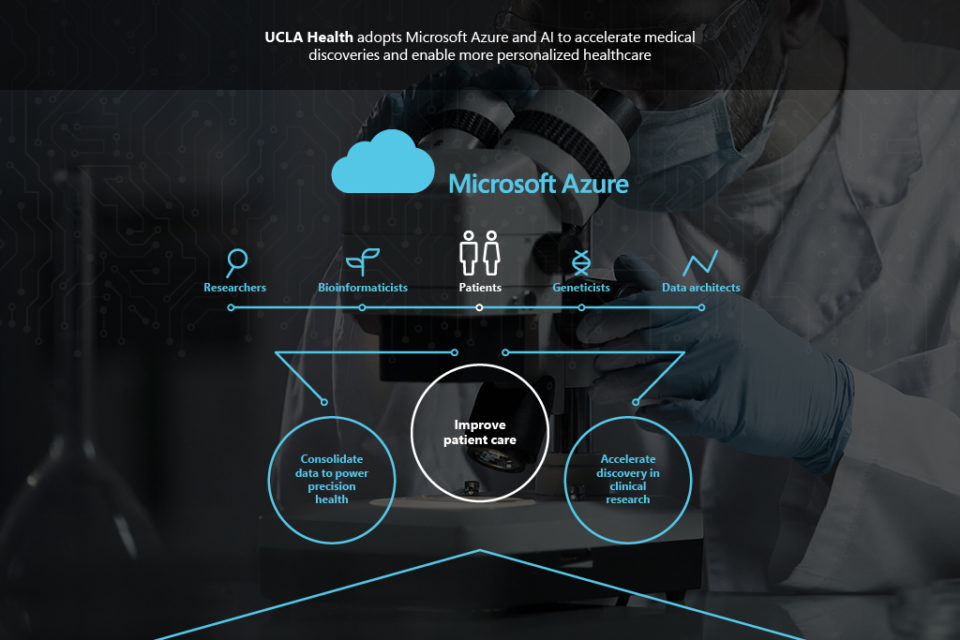Cloud computing will help enable the delivery of more personalized health care for UCLA patients
LOS ANGELES and REDMOND, Wash. — May 30, 2019 — UCLA Health is deploying Microsoft cloud computing services to enable UCLA Health and the David Geffen School of Medicine to synthesize vast amounts of clinical and research data to speed medical discoveries and improve patient care.
Microsoft Azure, a cloud computing service, will provide UCLA Health with a standard platform through which disparate clinical information and research tools can be secured and managed by the health system. The solution will provide UCLA Health with advanced computing tools to more rapidly interpret and mobilize insights from such data and to enhance collaboration among researchers.
“Our data capabilities with Microsoft Azure will bring more medical discoveries and effective therapies to patients faster,” said Michael Pfeffer, M.D., assistant vice chancellor and chief information officer for UCLA Health Sciences. “The integration of information from structured data, like lab results and medication information, with unstructured data, like documentation, genomics and medical images, creates an incredibly powerful big-data learning platform for discovery.”
UCLA scientists will use the cloud computing tools to more efficiently analyze a variety of data sources. The artificial intelligence (AI) embedded in the tools enables speedy processing of data to glean insights for use by physicians and researchers. Machine learning enables software to recognize and act on important data patterns without the need for human instruction, producing discoveries as never before.
“Analyzing large data sets to make scientific discoveries is a race against time,” said Mohammed Mahbouba, M.D., chief data officer for UCLA Health Sciences. “Using machine learning to analyze a combination of clinical and genomics data can provide critical insights, but doing so with a traditional computing infrastructure can require significant processing time. Azure enables us to quickly deploy and scale high-performance computing environments that can reduce the required processing time — sometimes from months to days — to make discoveries.”
UCLA Health’s move to cloud computing is intended to advance the health system’s delivery of precision health, or the use of data and a patient’s individual circumstances, to tailor a more effective treatment. In 2017, UCLA Health and the David Geffen School of Medicine launched the UCLA Institute for Precision Health, led by Daniel Geschwind, M.D., Ph.D., to bring together faculty across multiple disciplines to make large-scale genetic and genomic research actionable for patient care. The David Geffen School of Medicine also partnered with the UCLA Samueli School of Engineering to establish a department of computational medicine, chaired by Eleazar Eskin, Ph.D., to leverage scholarship in data sciences to discover new approaches to analyzing health data.
“We are committed to creating better patient outcomes by providing UCLA Health with Microsoft Azure cloud and AI solutions to improve treatments and lives,” said Peter Lee, corporate vice president, Microsoft Healthcare. “By connecting health data and systems in the cloud in an interoperable way, we’re excited we can help advance health care data for more efficient and personalized care.”
The Azure platform employs industry-leading technology to help protect and secure sensitive data, allowing UCLA Health to continue to ensure compliance with the Health Insurance Portability and Accountability Act, or HIPAA. Patient data in UCLA Health’s platform will not be shared with Microsoft as part of this agreement.
“Another advantage of cloud computing is the way it enables UCLA researchers to more efficiently and securely work with their peers,” said Paul Boutros, Ph.D., director of Cancer Data Science at UCLA Jonsson Comprehensive Cancer Center.
“Cloud computing will allow researchers from different fields and institutions to collaborate, joining data sets and software from different formats that could not previously be integrated in a simple way,” Boutros said. “We’re bringing together new communities of experts — including computer scientists, engineers, material scientists and others — to solve the biggest health care questions. This platform allows us to provide our research collaborators with secure access to important data in one place, without moving sensitive, private health information.”
The platform’s capabilities will also enable UCLA Health to use predictive analytics, or the analysis of historical data to model and assess what might happen in the future, to aid in disease prevention.
More about UCLA Health’s efforts in precision health can be found at https://www.uclahealth.org/precision-health/.
About UCLA Health
UCLA Health is among the world’s most comprehensive academic health systems, with a mission to provide state-of-the-art patient care, train top medical professionals and support pioneering research and discovery. UCLA Health includes four hospitals on two campuses — Ronald Reagan UCLA Medical Center; UCLA Medical Center, Santa Monica; UCLA Mattel Children’s Hospital, and the Stewart and Lynda Resnick Neuropsychiatric Hospital at UCLA — as well as the David Geffen School of Medicine at UCLA. UCLA Health also offers an array of primary and specialty services at more than 170 clinics throughout Southern California. UCLA Health hospitals in Westwood and Santa Monica ranked No. 1 in Los Angeles and No. 7 nationally in the 2018-19 U.S. News & World Report assessment.
About Microsoft
Microsoft (Nasdaq “MSFT” @microsoft) enables digital transformation for the era of an intelligent cloud and an intelligent edge. Its mission is to empower every person and every organization on the planet to achieve more.
For more information, press only:
Microsoft Media Relations, WE Communications for Microsoft, (425) 638-7777, [email protected]
Ryan Hatoum, UCLA Health, (310) 267-8304, [email protected]
Note to editors: For more information, news and perspectives from Microsoft, please visit the Microsoft News Center at http://news.microsoft.com. Web links, telephone numbers and titles were correct at time of publication, but may have changed. For additional assistance, journalists and analysts may contact Microsoft’s Rapid Response Team or other appropriate contacts listed at http://news.microsoft.com/microsoft-public-relations-contacts.





